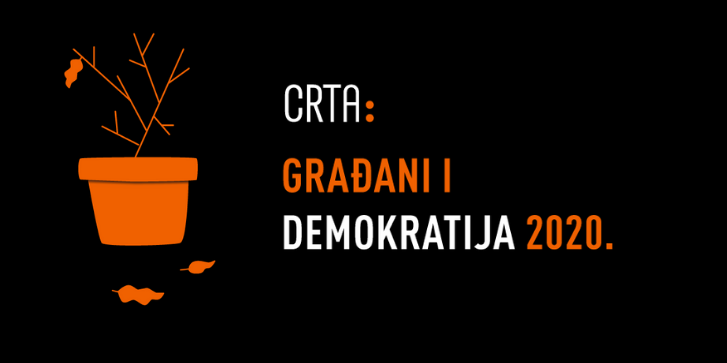Citizens are tired of the quest for democracy

Serbia is formally a democratic state and a polarised society in which key democratic institutions, such as the Parliament or the elections, have been collapsing for years, critical thinking restrained, and citizens discouraged and detracted from participating in democratic processes – this is the conclusion of the conference at which the findings of the public opinion survey “Attitudes of Serbian citizens on participation in democratic processes 2020” conducted by the CRTA were presented.
“For a long time now, those who run the country have been deliberately ignoring the problems of weakening democracy. As advocates of the values of democracy, we do not promise easy solutions and we do not use populist tricks, which are pouring in from everywhere. Our task is to convince the citizens that they “live” on democracy and that the future of this society depends on the recovery of democratic institutions. There is no freedom without democracy,” said Vukosava Crnjanski, Director of the CRTA.
While slightly more than one third of Serbian citizens, 37 percent, are interested in politics, the majority generally do not believe that their activity can influence change in Serbia. In the past year, two thirds of citizens did not participate in any action or initiative aimed at solving problems in the local community.
Voting in the elections is an activity that the largest number of citizens, about 50 percent, see as an opportunity for personally contributing to change. The most common motive for going to the polls is a sense of duty (for 44 percent of citizens), and only after that the desire to influence politics in the country (for 32 percent). The most common motive for abstinence is the fact that citizens do not believe in the promises made by parties participating in the elections.
“When we talk about participation in democratic processes, the most pronounced and present differences in the attitudes of citizens are related to their political affiliation. The citizens’ inclination to ruling parties, to the opposition or neither, is strongly related to almost all findings on their interest in political issues, participation in democratic processes, main political views and satisfaction with the work of political institutions,” said Vujo Ilić, Public Policy and Research Advisor at the CRTA.
As far as the citizens’ participation in political processes is concerned, it is important to find a way to alleviate the dominant political divisions, and also to include in democratic processes the majority of citizens who find the existing political options distant from them.
“Citizens are tired of searching for democracy, they are moving away from politics because they think that “everyone is the same” and that “politics is something bad”. In a situation of such demotivation, support should be provided to all those who are still engaged, and all citizens should be motivated to participate in the election process because there are no other options for change,” said Dušan Spasojević, associate professor at the Faculty of Political Sciences.
The survey was conducted by telephone on a random and representative sample in November 2020.
A summary of the research in the form of a presentation can be found here.
The complete research report is available on this link.








